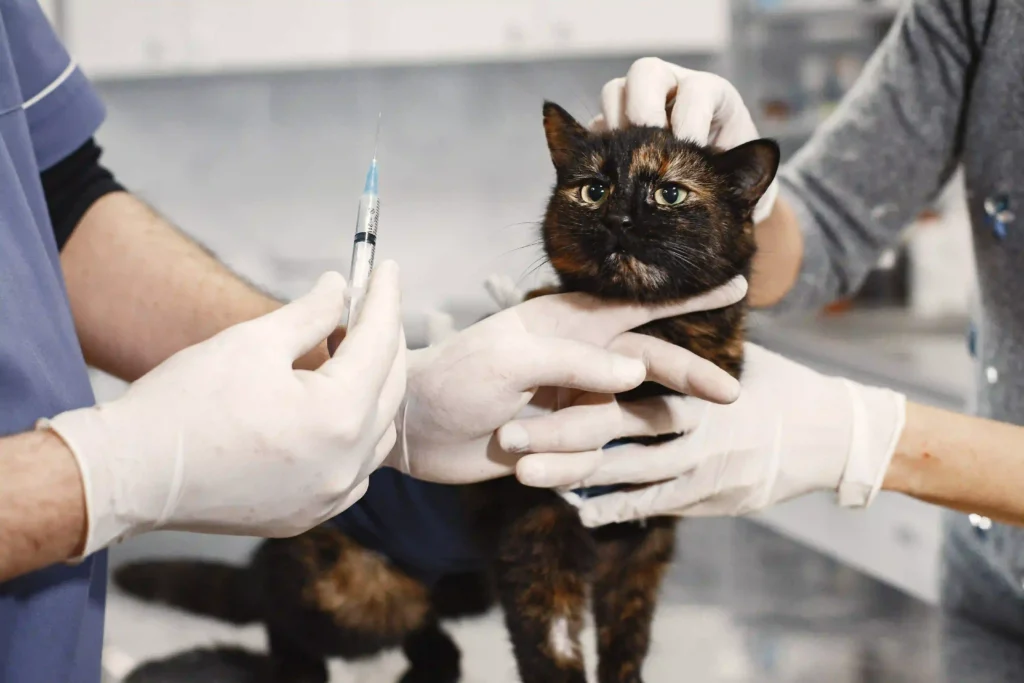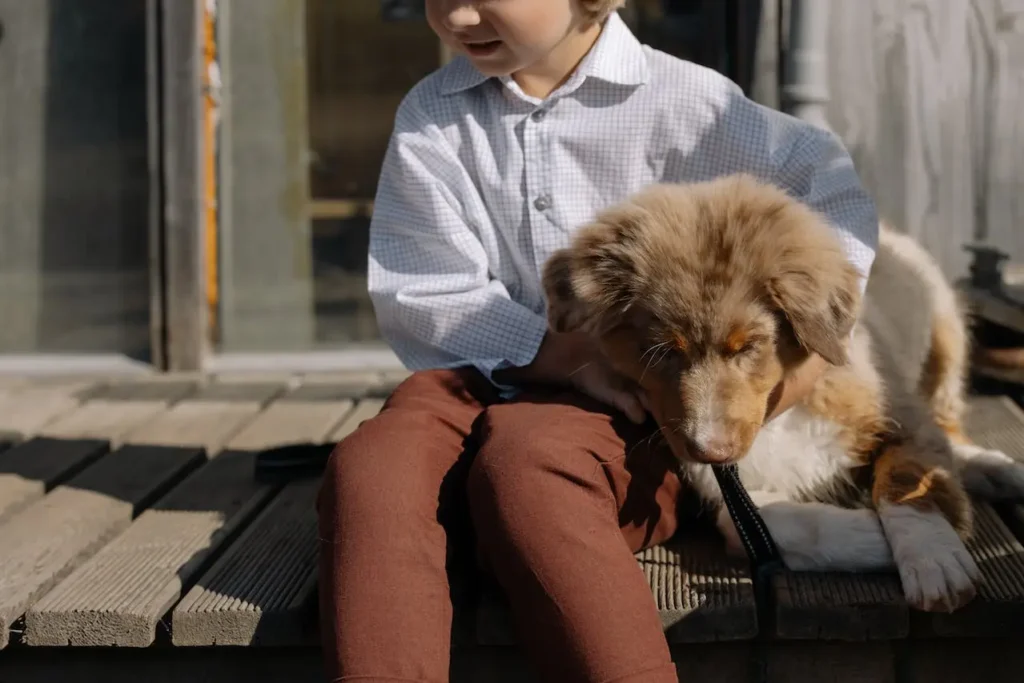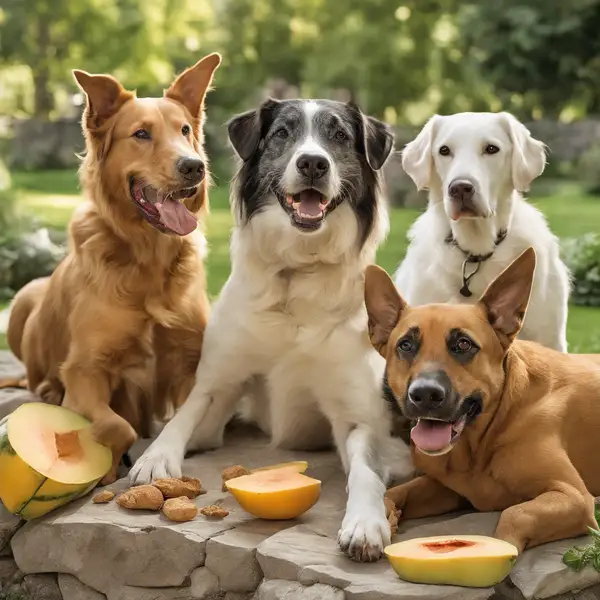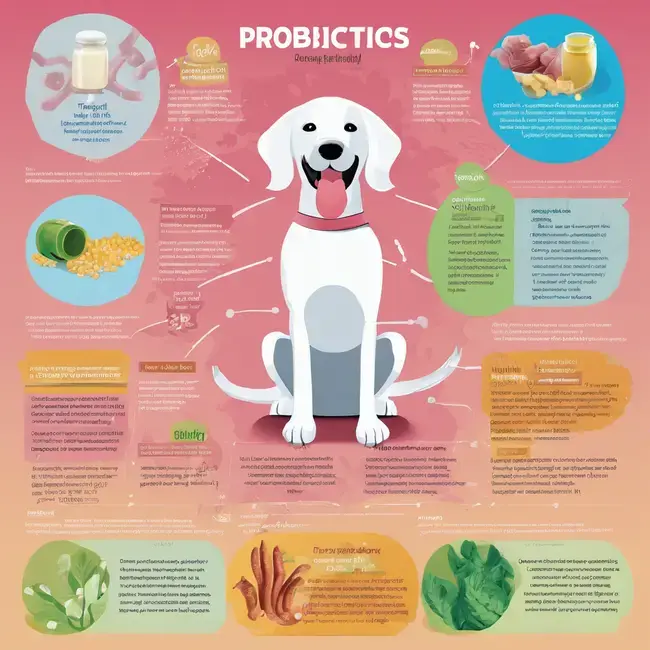Can Dogs Eat Corn? Discover 5 Nutritional Benefits and Risks
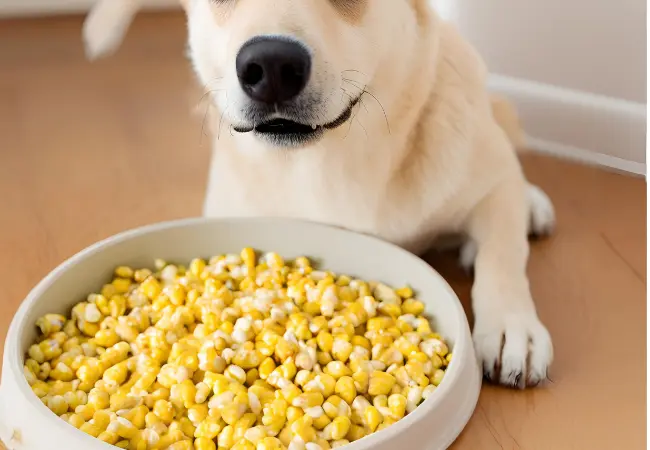
- Can dogs eat corn?
- Is corn good for dogs?
- The nutritional composition of corn
- Nutritional benefits of corn for dogs
- Potential risks and concerns of corn for dogs
- Guidelines for feeding corn to dogs
- Can dogs eat corn cobs or corn on the cob?
- Is canned corn safe for dogs?
- Is corn gluten meal good for dogs?
- Can dogs eat cooked corn?
- Is corned beef safe for dogs?
- Can dogs eat corn tortillas?
- Alternatives to Corn for Dogs
- The Verdict: Can dogs eat corn?
- FAQs
This post may contain affiliate links, meaning I may earn a commission if you make a purchase, at no extra cost to you. I only recommend products I trust. Thank you for your support.
As a devoted pet parent, you’re always on the lookout for wholesome treats and snacks to share with your dog.
Corn, a staple in many human diets, often catches your eye as a potential option. But the question lingers: is corn safe for dogs to eat?
Let’s embark on a journey to unravel the mysteries surrounding the age-old query, “Can dogs eat corn?”
In this comprehensive guide, we’ll delve deep into the nutritional value of corn for dogs, exploring the potential benefits and risks associated with incorporating this beloved vegetable into your pup’s diet.
From addressing common concerns like allergies and digestibility to providing practical tips on safe serving methods, we’ve got you covered.
So, grab a bowl of (air-popped, unsalted) popcorn, and let’s dive in!
Can dogs eat corn?
Yes, dogs can eat corn as it is not toxic and provides various health benefits. However, it should be served in small portions, off the cob, and without any added ingredients.
Corn is a source of essential nutrients but should not exceed 10% of your dog’s daily caloric intake. It should only make up a small portion of your dog’s diet.
Avoid feeding your dog certain corn products like canned corn and creamed corn. Canned corned often contains high sodium levels, and creamed corn includes ingredients like milk and butter, which can cause gastrointestinal upset in dogs.
Additionally, hard, unpopped corn kernels are also a no-go, as they can be difficult for dogs to digest and may lead to gastrointestinal upset.
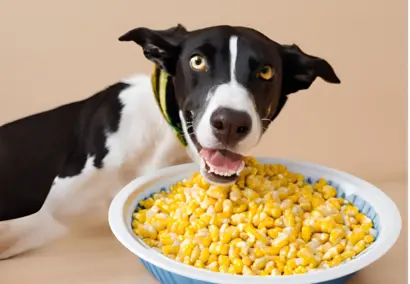
Is corn good for dogs?
Yes, corn is good for dogs especially when fed in moderation. It provides essential nutrients, vitamins, and minerals, and is low in fat.
However, it’s important to monitor for allergies and serve corn plain and off the cob to avoid health risks.
The nutritional composition of corn
Corn, a member of the grass family, is a versatile grain that offers a unique blend of nutrients.
Let’s take a closer look at its nutritional composition:
- Carbohydrates: Corn is a rich source of carbohydrates, providing a readily available source of energy for active pups.
- Protein: While not a complete protein source, corn contains some plant-based proteins that can complement your dog’s overall protein intake.
- Fiber: Corn offers a decent amount of dietary fiber, which can aid in digestion and promote gut health.
- Vitamins and Minerals: Corn is a good source of several vitamins, including vitamin B complex, antioxidants, and minerals like magnesium and phosphorus.
- Antioxidants: Corn contains antioxidants like beta-carotene and vitamin E, which can help protect your dog’s cells from damage caused by free radicals.
Nutritional benefits of corn for dogs
While corn should not be the primary ingredient in your dog’s diet, it can offer some potential benefits of corn for dogs when included in moderation.
Here are some nutritional benefits of corn for dogs:
1. Source of Energy
- Corn is a good source of carbohydrates, which can provide dogs with a quick source of energy. This is particularly beneficial for active dogs that require a lot of energy for their daily activities.
2. Rich in Vitamins and Minerals
- Vitamin A: Good for vision, immune function, and skin health.
- Vitamin B: Essential for energy production and brain function. Corn contains several B vitamins, including thiamine (B1), pantothenic acid (B5), and niacin (B3).
- Vitamin E: An antioxidant that helps protect the body against oxidative damage.
- Minerals: Corn contains minerals such as magnesium, which is important for bone health, and zinc, which supports the immune system.
3. Digestive Health
- The fiber content in corn for dogs can aid in promoting regular bowel movements and maintaining a healthy digestive system.
4. Coat and Skin Health
- The linoleic acid, an essential fatty acid found in corn, can contribute to maintaining a healthy coat and skin in dogs.
5. Antioxidant Support
- The antioxidants present in corn may help support your dog’s overall health by neutralizing free radicals and reducing oxidative stress.
Potential risks and concerns of corn for dogs
While corn can be a nutritious addition to your dog’s diet in moderation, it’s essential to be aware of the potential risks and concerns associated with feeding corn for dogs.
Here are some risks of corn for dogs:
1. Allergies
- While rare, some dogs may develop allergies or sensitivities to corn. Symptoms of a corn allergy can include itching, skin irritation, digestive issues, and respiratory problems.
2. Digestibility Challenges
- Whole corn kernels can be challenging for dogs to digest, as they lack the necessary enzymes to break down the tough outer shell leading to gastrointestinal upset, such as gas, bloating, or diarrhea.
3. Weight Gain
- Corn is a high-carbohydrate food and relatively high in calories. Excessive consumption of corn can contribute to weight gain and obesity in dogs, especially if they lead a sedentary lifestyle.
4. Choking Hazards and Intestinal Blockages
- Feeding dogs corn on the cob can pose a choking hazard and also lead to intestinal blockages, which can be life-threatening. It’s crucial to always remove the corn kernels from the cob before serving.
5. Pancreatitis
- Some processed creamed corn products contain high-fat content and excessive consumption of fatty foods can lead to pancreatitis in dogs. Read how to manage pancreatitis in dogs?
Guidelines for feeding corn to dogs
When feeding corn to dogs, it’s important to follow specific guidelines to ensure their safety and well-being.
Here are some essential guidelines for feeding corn to dogs:
1. Moderation and Portion Control
Treats, including corn, should generally not exceed 10% of your dog’s daily caloric intake to avoid unbalancing their diet and contributing to obesity.
2. Remove Corn from the Cob
Always remove the corn kernels from the cob before serving, as corn cobs can pose a choking hazard and lead to potential intestinal blockages.
3. Avoid Certain Corn Products
Be cautious with canned corn and creamed corn, as they may contain high levels of added sodium, sugars, and fats, which can be harmful to dogs.
4. Monitor Reactions
Introduce corn gradually into your dog’s diet and monitor for any signs of allergic reactions or sensitivities, such as itching, skin redness, ear infections, or digestive issues.
5. Serve Plain Corn
Avoid feeding dogs corn with added ingredients such as butter, salt, or other seasonings, as these can be harmful to dogs.
6. Cook Thoroughly
Cooked corn is generally easier for dogs to digest than raw corn. Boiling or steaming the kernels can make them more palatable and digestible.
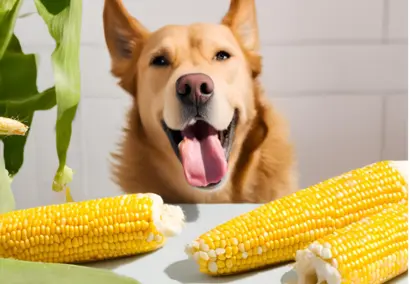
Can dogs eat corn cobs or corn on the cob?
Absolutely not! corn cobs pose a significant choking hazard and can cause intestinal blockages if ingested.
The tough, fibrous nature of the cob makes it indigestible for dogs, and it can potentially lead to severe health complications, including the need for surgical intervention.
Is canned corn safe for dogs?
No, canned corn is not a recommended option for dogs due to its high sodium content which can lead to salt poisoning in dogs, causing symptoms such as vomiting, diarrhea, decreased appetite, lethargy, and more.
Therefore, it’s essential to avoid feeding dogs canned corn to prevent potential health risks.
Is corn gluten meal good for dogs?
The suitability of corn gluten meal for dogs is not definitive. There is an ongoing debate around its nutritional completeness and digestibility.
Corn gluten meal is considered deficient in essential amino acids, such as lysine, arginine, and tryptophan, making it an incomplete protein source for dogs.
It’s also noted that corn gluten meal is not as digestible for dogs as normal, cooked corn. This may impact its overall nutritional value for dogs.
Can dogs eat cooked corn?
Yes, dogs can safely consume cooked corn in moderate amounts. However, it’s crucial to serve plain, cooked corn kernels to dogs, ensuring that the corn is free from any harmful additives such as butter, salt, or other seasonings.
These additives can be detrimental to a dog’s health, potentially leading to conditions such as pancreatitis, obesity, and salt poisoning.
Cooked corn can aid in digestion and provide dogs with various nutrients that support their overall health, immune function, and energy levels.
Is corned beef safe for dogs?
No, corned beef is not recommended for dogs due to several reasons, including its high fat content, high sodium content, and the potential presence of harmful additives.
The high fat content in corned beef can lead to digestive issues in dogs, including vomiting, diarrhea, and pancreatitis. It can also contribute to obesity and related health problems.
Corned beef is preserved with a significant amount of salt, which can lead to salt poisoning in dogs if consumed in large quantities. Symptoms of salt poisoning include vomiting, diarrhea, excessive thirst, and lethargy.
Corned beef often contains additives such as garlic and onions, which are toxic to dogs and can cause damage to their red blood cells, leading to a condition called hemolytic anemia.
Can dogs eat corn tortillas?
Yes, dogs can eat plain, unseasoned corn tortillas that are free from potentially harmful additives such as salt, spices, or excessive oil but in very small quantities or occasionally.
While plain corn tortillas are generally safe for dogs to eat, others may experience digestive issues if they are not accustomed to consuming this food.
Corn tortillas offer limited nutritional value. They primarily provide carbohydrates and a modest amount of protein but lack essential nutrients necessary for a balanced dog diet.
Alternatives to Corn for Dogs
If you’re concerned about the potential risks associated with corn for dogs, or if your dog has a corn allergy, several nutritious options can be incorporated into their diets to provide essential nutrients and variety.
Here are some alternatives to corn for dogs:
1. Sweet Potatoes
Rich in vitamins, minerals, and fiber, sweet potatoes are a nutritious and easily digestible option for dogs.
2. Pumpkin
Packed with fiber and antioxidants, pumpkin can be a great addition to your dog’s diet, promoting digestive health and overall well-being.
3. Quinoa
This ancient grain is a complete protein source and provides essential amino acids, making it a nutritious alternative to corn.
4. Brown Rice
Brown rice is a whole grain that offers a good source of fiber and can be easily incorporated into your dog’s meals.
5. Oats
Oats are a great source of soluble fiber and can be a gentle addition to your dog’s diet, especially for those with sensitive stomachs.
6. Peas
Peas can be a valuable alternative to corn for dogs, offering fiber, vitamins, and minerals. They can be served cooked or frozen and make a nutritious addition to a dog’s diet.
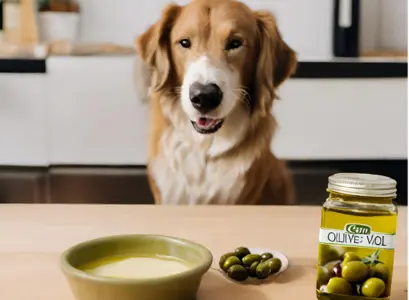
7. Olive Oil
Olive oil can provide healthy fats and antioxidants for dogs. When used in moderation, it can contribute to a dog’s overall well-being and help support their coat and skin health.
8. Cauliflower
Cauliflower is a low-calorie vegetable that can be beneficial for dogs. It provides vitamins, fiber, and antioxidants and can be served cooked or raw as a healthy treat.
9. Celery
Celery is a crunchy and low-calorie vegetable that can serve as a healthy alternative to corn for dogs. It offers vitamins, minerals, and hydration.
10. Cantaloupe
Cantaloupe can be a refreshing and nutritious treat for dogs when served in moderation. It is rich in vitamins A and C and provides hydration due to its high water content.
11. Broccoli
Broccoli is a nutrient-dense vegetable that can be included in a dog’s diet in small amounts. It offers vitamins, fiber, and antioxidants.
12. Salmon
Salmon is excellent sources of protein and omega-3 fatty acids. When properly prepared and served in moderation, it can be valuable additions to a dog’s diet.
13. Bananas
Bananas can serve as a natural and healthy treat for dogs. They are rich in potassium, vitamins, and fiber, offering a range of health benefits.
The Verdict: Can dogs eat corn?
After exploring the nutritional composition, potential benefits and risks of corn for dogs, we can conclude that corn is good for dogs and dogs can indeed eat corn when fed in moderation.
Remember corn should be treated as an occasional treat or supplement, not a primary component of your dog’s diet.
Corn, when served without harmful additives such as salt, butter, or seasoning, can offer essential nutrients and contribute to a balanced canine diet.
However, high sodium content in certain forms of corn, such as canned or processed corn products like corned beef, can pose health risks to dogs.
Consult with your veterinarian for personalized pet dietary recommendations and guidance, especially if your dog has specific health conditions or concerns.
Ultimately, every dog is unique, and their nutritional needs may vary based on factors such as age, breed, activity level, and overall health.
You may also be interested to check out these trending articles:
- What is chicken meal in dog food?
- Can dogs eat raw chicken?
- 100 tasty low fodmap snacks
- 30-day lbs diet plan: low fodmap
- 30-day carnivore diet meal plan
- Is shrimp good for dogs?
- 7 day low-sodium diet meal plan
- Top 12 caregiver duties
- Foods to avoid if alkaline phosphatase is high
- Foods to avoid with trulicity
- Endometriosis diet plan
FAQs
Can dogs eat corn bread?
While a small bite of corn bread is unlikely to harm a dog, it’s best to avoid feeding them corn bread, especially if it contains ingredients like butter, milk, or cream, which can cause gastrointestinal upset.
Can dogs eat cornmeal?
While many dog food brands use cornmeal as a filler, it’s not easily digestible for many dogs and lacks nutritional value.
Can dogs eat sweet corn?
Sweet corn can be given to dogs in small amounts and on occasion, but its higher sugar content and starchiness should be taken into consideration.
What happens if a dog eats a piece of corn?
If a dog eats a piece of corn, it may not pose a significant risk if it’s a small amount of plain, cooked corn.
However, if the corn contains additives, seasoning, or is inedible (such as corn on the cob), it can lead to digestive issues, choking hazards, or intestinal blockages.
Immediate veterinary attention is necessary if a dog ingests a large amount or any inedible parts of corn.
Should you avoid corn in dog food?
Whether to avoid corn in dog food depends on the individual dog’s dietary needs and any existing health conditions.
While some dogs can tolerate and benefit from corn as a source of nutrients and fiber, others may have sensitivities or allergies to corn.
